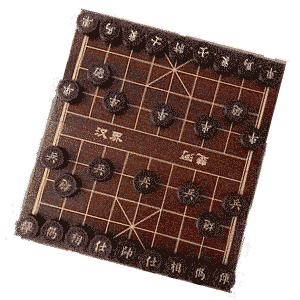Xiangqi is the origin of Chess
by Derk Boonstra
(Amstelveen, Netherlands)
Original Chaturanga, meaning 4 armies, has the same idea as Pachisi, played by 4 players. These can mutually interact in fighting the other players. This happens in secret, which is the very fun of the game, as long as dices are used. The difference with Pachisi is that Chaturanga is played on a 8 x 8 Ashtapada board.
When Indian monks or traders came to China, they saw how Xiangqi was played. That gave them the idea of reshaping the 4 x 8 Chaturanga pieces into King/General, Elephant/Ship, Horse, "Castle", "Soldier and applying the Xiangqi rules for (a) moving and (b) eating pieces.
However, when playing this way it was not clear anymore how to define the concept of winning. So after studying Xiangqi a bit closer the players decided to abolish dices and to play the game with only one opponent instead of three. Meanwhile they kept using the name Chaturanga.
This explains how it happens that the name Chaturanga now is used for two totally different games.
It is typically Commonwealth-British to give India the honor of a Chinese invention. Throughout the 20th century Harold James Ruthven Murray has been the broadly acclaimed advocate of this opinion in his A History of Chess. This book contains as many pages though as there is basically little logic in his narrative.









